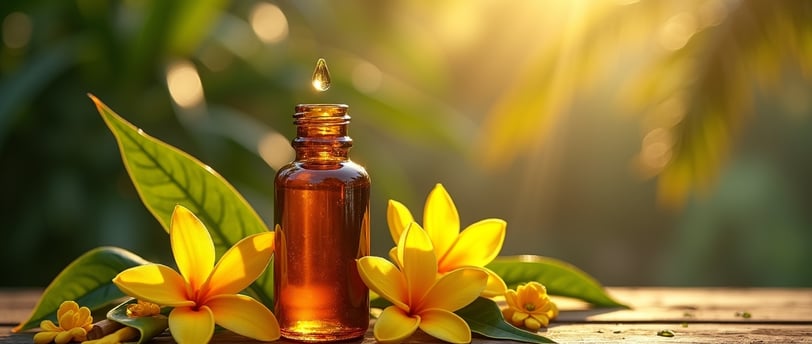Ylang Ylang: The Oil of Euphoria
ESSENTIAL OIL
Andy
6/8/20253 min read


Ylang-ylang (Cananga odorata) essential oil, derived from the fragrant flowers of the tropical tree native to Southeast Asia, is celebrated for its rich, floral aroma and diverse therapeutic properties. Traditionally used in perfumery and aromatherapy, it has garnered attention in modern health and beauty industries for its potential benefits in skincare, emotional well-being, and more.
Key Benefits in Health, Cosmetics, and Beauty Products
Skin Care: Ylang-ylang oil exhibits antimicrobial properties, making it beneficial for managing acne and promoting clear skin. Its anti-inflammatory effects can soothe irritated skin, contributing to a healthier complexion.
Hair Care: The oil is known to stimulate the scalp, potentially promoting hair growth and reducing hair fall. Its moisturizing properties help in maintaining hair softness and shine.
Emotional Well-being: Ylang-ylang's calming scent is effective in reducing stress, anxiety, and promoting relaxation. It's often used in aromatherapy to uplift mood and alleviate symptoms of depression.
Cardiovascular Support: Inhalation of ylang-ylang oil has been associated with lowering blood pressure and heart rate, contributing to cardiovascular health.
Chemical Constituents
Ylang-ylang essential oil comprises various bioactive compounds, including:
Linalool: Offers calming and anti-anxiety effects.
Geranyl Acetate: Contributes to the oil's floral aroma and has mood-enhancing properties.
Caryophyllene: Exhibits anti-inflammatory and analgesic effects.
Benzyl Acetate: Provides the characteristic sweet scent and has sedative qualities.
Farnesene: Known for its calming and anti-inflammatory properties.
The composition can vary based on factors like the distillation process and the plant's geographical origin.
Mechanism Behind the Chemicals
The therapeutic effects of ylang-ylang oil are attributed to its chemical constituents:
Anxiolytic and Sedative Effects: Compounds like linalool interact with the GABAergic system, promoting relaxation and reducing anxiety.
Anti-inflammatory Action: Caryophyllene and farnesene help in reducing inflammation, benefiting skin health.
Antimicrobial Properties: The oil's constituents exhibit antibacterial and antifungal activities, aiding in skin protection.
Biological Activities and Research Evidence
Studies have highlighted several biological activities of ylang-ylang oil:
Antioxidant Activity: The oil demonstrates significant antioxidant properties, combating oxidative stress.
Antibacterial and Antifungal Effects: Effective against various pathogens, supporting its use in treating skin infections.
Mood Enhancement: Research indicates its potential in alleviating depression and improving emotional well-being.
Common Cosmetic & Personal Care Uses
Ylang-ylang oil is incorporated into various personal care products:
Facial Serums and Creams: To balance oil production and enhance skin radiance.
Hair Oils and Shampoos: For promoting hair growth and maintaining scalp health.
Bath Oils and Soaps: To provide a calming and aromatic bathing experience.
Perfumes: Valued for its sweet, floral fragrance.
Tips for Choosing High-Quality Ylang-Ylang Oil – Botanical Specificity Matters
Extraction Method: Opt for steam-distilled oils, preferably from the first distillation (Ylang-Ylang Extra) for the highest quality.
Purity: Ensure the product is 100% pure ylang-ylang essential oil without additives.
Packaging: Choose oils packaged in dark glass bottles to protect against light-induced degradation.
Source: Select oils derived from organically grown Cananga odorata to ensure purity.
Cultural Importance
Ylang-ylang has been used traditionally in various cultures:
Indonesia: Flowers are spread on the beds of newlyweds to promote romance.
Philippines: Used in traditional medicine for treating cuts, burns, and insect bites.
Molucca Islands: Utilized in making a popular hair pomade known as Macassar Oil.
Best Producing Regions
Ylang-ylang thrives in tropical climates and is predominantly cultivated in:
Madagascar: Known for producing high-quality ylang-ylang oil.
Comoros Islands: Significant exporter of the oil.
Indonesia and the Philippines: Traditional cultivation regions with rich histories of use.
Cautions and Side Effects
While ylang-ylang oil is generally safe, some considerations include:
Skin Sensitivity: May cause irritation in sensitive individuals; a patch test is recommended.
Headaches and Nausea: Excessive inhalation can lead to headaches or nausea.
Pregnancy and Breastfeeding: Consult a healthcare provider before use during these periods.
Bottom Line
Ylang-ylang essential oil is a versatile and aromatic oil offering numerous benefits for health, cosmetics, and beauty applications. Its unique composition of bioactive compounds makes it an excellent choice for skin and hair care routines, as well as for promoting emotional well-being. When selecting ylang-ylang oil, prioritize steam-distilled, pure products from reputable sources to ensure maximum efficacy and safety.
References:
Hammouti B, et al. "Chemical Composition, Antioxidant, Antibacterial, and Hemolytic Properties of Ylang-Ylang (Cananga odorata) Essential Oil: Potential Therapeutic Applications in Dermatology." Pharmaceuticals 2024, 17(10), 1376. doi.org/10.3390/ph17101376
Loh Teng Hern et al. “Traditional Uses, Phytochemistry, and Bioactivities of Cananga odorata (Ylang-Ylang).” Evidence-based complementary and alternative medicine. eCAM vol. (2015): 896314. doi:10.1155/2015/896314